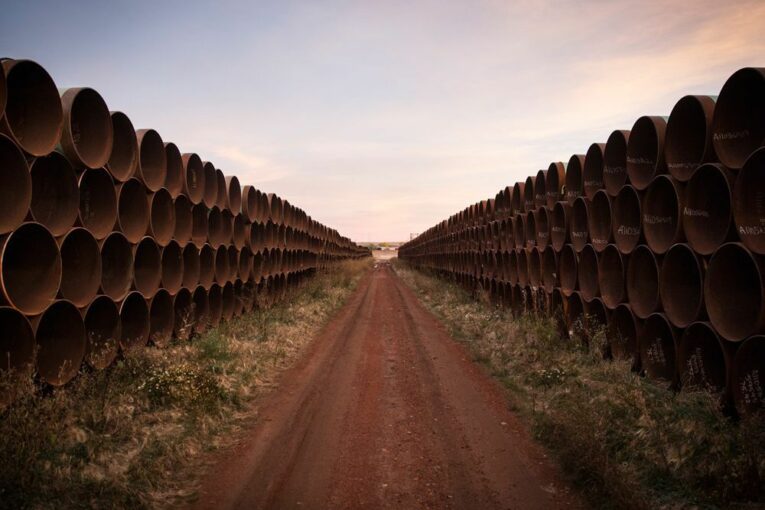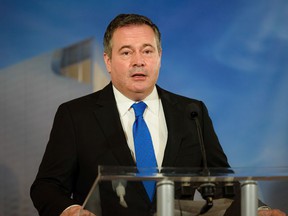
You might expect US$105-a-barrel crude prices, concerns surrounding security of supply and sanctions on Russian energy would drive a new slate of developments in Canada’s oilpatch.
Don’t hold your breath just yet — at least when it comes to reviving Keystone XL or projects to significantly boost Canadian production or energy infrastructure.
Industry leaders and analysts believe surging commodity prices, tight supplies and an unstable geopolitical landscape are starting to reshape the energy debate.
However, any meaningful changes will take time.
“It is shifting the discussion in Washington and Ottawa from climate and sustainability back to include traditional energy security considerations,” Robert Johnston, managing director of energy and climate with Washington-based political risk consultancy Eurasia Group, said Tuesday.
“But I don’t know how much further it goes . . . We know the current governments are going to stay focused on climate and probably double down in some ways on energy transition.”
On Tuesday, benchmark West Texas Intermediate crude shot up briefly above $106 a barrel as the Russian invasion of Ukraine continues and geopolitical factors rattle energy markets, before closing the day at $103.40 a barrel.
Russia is the largest oil exporter in the world.
Michael Tran, RBC’s managing director of global energy strategy, said oil markets were already in the early phases of a “super-cycle,” even before the conflict began.
Now, after a decade of industry underinvestment and a drawing down of OPEC’s spare capacity, the “coiled spring” is unravelling, Tran said.
“If we think about the next frontier for where oil prices can go, we have crossed the Rubicon here,” he said.
On Monday, Prime Minister Justin Trudeau declared Canada would ban the import of Russian oil and petroleum products because of its invasion of Ukraine.
Meanwhile, several large international oil companies, including Shell and Norway’s Equinor, have indicated they will divest Russian joint ventures or operations.
Faced with rising prices, the International Energy Agency said Tuesday that member countries will release 60 million barrels from their strategic petroleum reserves to ensure there are no supply shortfalls.
“Global energy security is under threat,“ IEA executive director Fatih Birol said in a statement.
Premier Jason Kenney said the situation highlights the broader issue of security of supply, something that used to dominate oil and gas policy in North America in the past.
Russian natural gas imports account for 38 per cent of EU demand, while up to 2.3 million barrels per day of the country’s 4.6 million bpd of oil exports are shipped to Western countries, according to consultancy Wood Mackenzie.
“There must be a fundamental rethink of energy policy across the world and here in North America,” Kenney told reporters on Tuesday.
With the third-largest oil reserves in the world, Canada could increase production and displace oil from countries such as Russia, he added.
But when will that happen?
“I know some people out there are saying, ‘Well, you know it takes years to get pipelines built and to get a major energy (project) in production and that none of that’s going to stop the 40-mile-long convoy of Russian tanks headed toward Kyiv right now,’ ” said the premier.
“True. But we also have to play the long game.”

Kenney has been pushing for the U.S. administration to relook at its cancellation of permits for the Keystone XL pipeline, which was designed to take additional barrels of Canadian oil to Gulf Coast refineries.
White House press secretary Jen Psaki told ABC TV that Keystone XL would not solve any of the country’s energy issues. Instead, the president’s view is the U.S. needs to reduce its dependence on foreign oil and “on oil in general,” she said.
This sentiment is, in part, keeping producers on the sideline on new projects given the uncertainty facing the industry’s future, and ongoing pressure from investors to maintain financial discipline.
“If I was sitting in Trudeau’s or Biden’s seat right now, I’d be looking at Europe and how they effectively outsourced their energy needs to Russia and the Middle East — and that is not a great place to be,” said Baytex Energy CEO Ed LaFehr.
“This whole geopolitical instability is going to change the conversation. And that’s part of what it will take for the energy industry to want to reinvest for growth. It’s going to have to be some barrels are no longer coming into the continent.”
In Canada and the U.S., capital discipline continues to prevail for petroleum producers.
Surge Energy CEO Paul Colborne said the junior oil and gas company has set its budget and won’t change it “by one iota,” focusing instead on paying down debt and returning money to investors.
He doesn’t expect many oil producers will substantially alter their plans until government attitudes toward the sector shift.
“The politicians have to start realizing how important crude is,” he said.
After the volatility of the early months of the pandemic, Canadian companies remain focused on repairing their balance sheets, said NuVista Energy CEO Jonathan Wright.
To increase output, the industry needs to see a price signal, as well as improved sentiment that supports increasing production and backs export projects, such as for LNG facilities that can ship Canadian gas to Europe and Asia.
“The world is finally realizing that politicians who’ve been saying we just have to stop hydrocarbons . . . that it’s actually very bad policy,” Wright said.
“It’s taken years to get to this place and it will take some amount of time to get back to more balance and have the pendulum return to the middle.”
Johnston anticipates markets will eventually allocate more capital to oil and gas producers if prices remain high.
However, he doesn’t see a review of Keystone XL taking place, or speedy decisions to relax rules on building new pipelines or LNG terminals.
“If we get to $150 oil and $50 LNG (prices), then all bets are off,” Johnston added.
“For now, I’m not sure we will see a radical shift in policy from Ottawa or the Biden administration, yet.”
Chris Varcoe is a Calgary Herald columnist.
You can read more of the news on source
